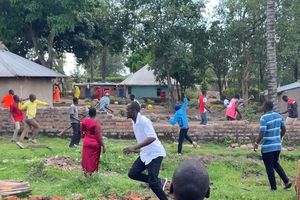
Members of the public try to force their way into St Joseph Mission of Messiah in Africa Church in Opapo Village in East Kamagambo Location in Rongo Sub-county, Migori County on April 11, 2025.
Parliament’s failure to enact a law to regulate religious organisations and protect Kenyans from cultic leaders is aiding the proliferation of extremist groups.
The activities of these predatory religious organisations remain unabated with two people dying in a Migori Church.
The Religious Organisations Bill 2024, a product of the Senate's inquiry into the Shakahola massacre, sought to control the proliferation of questionable organisations and also have them pay taxes from earnings in the form of offerings and tithes.
However, the Bill, which was never published because of the vested Church interests, proposed a fine of Sh5 million or three years in jail or both for owners of religious organisations that are not registered.
On Sunday, Tana River Senator Danson Mungatana, who chaired the Senate ad hoc committee that investigated the discovery in the Shakahola Forest, Kilifi of mass graves, revealed that the Bill was withdrawn after the religious leaders protested.

A shrine at Melkio St Joseph Missions of Messiah in Africa Church at Opapo Villlage in Rongo, Migori County on April 22, 2025.
“The religious leaders asked that the Senate Bill be withdrawn, promising to develop their own. We did. We have not seen theirs yet,” said Senator Mungatana even as Makueni Senator Dan Maanzo dismissed the Bill saying the country has enough laws.
Investigations by the Directorate of Criminal Investigations (DCI) indicated that the mass graves contained bodies of followers of Pastor Mackenzie, the self-proclaimed preacher, of Good News International Church, who indoctrinated his victims to death.
Towards the end of last year, over 400 bodies had been exhumed from the shallow graves with more than 600 others reported missing.
With the government seemingly not learning anything from the Shakahola mass graves, two members of the Melkio Saint Joseph Missions of Messiah Africa Church died inside the Church premises after refusing to seek medical attention, blamed on continued cases of religious indoctrination.
Shakahola revelations
As this happened, about 57 faithful of the church refused to go home insisting that they could only return to their church despite the death of their two colleagues.
So far, no one has been charged in court in relation to the deaths with fears that the activities at the church could mirror the Shakahola revelations.

The New Foundation Church, owned by controversial Pastor Abel Kahindi Gandi at Mwagandi village in Chakama location in Malindi, on April 24, 2025.
To address the proliferation of religious delinquencies in Kenya, the withdrawn Bill proposed to establish the Office of the Registrar of Religious Organisations (ORRO).
The Bill had proposed that the ORRO registers and regulates the formation and administration of religious organisations as well as ensure compliance with "the regulatory provisions of the law."
“A person shall not establish, manage, operate or assist in the establishment, management or operation of a religious organisation or an umbrella religious organisation unless the organisation is registered in accordance with this Act,” the Bills reads.
Mackenzie has since been charged in court for brainwashing hundreds of his followers and starving them to death.
Following the discovery of the mass graves in Shakahola, the Senate on April 27, 2023, adopted a motion establishing an Ad-hoc committee to investigate the “disturbing” Shakahola killings and the proliferation of religious organisations in Kenya.
In the report adopted by the Senate on December 4, 2023, the Mungatana-led Ad-hoc committee proposed the enactment of the Religious Organisation Bill to provide for regulation of religious organisations.
“The tragedy that is Shakahola has given us the reason, opportunity, courage and excuse for us to face the religious leaders and tell them that they will be regulated. Religious organisations must be regulated,” said Kakamega Senator Boni Khalwale, the initiator of the motion that led to the formation of the Ad-hoc committee.

The family of a GSU officer who died and was buried in a church compound seek help from the Office of the Deputy County Commissioner in Rongo, Migori County, on April 11, 2025.
But Senator Maanzo said that the Religious Organisations Bill was superfluous to the many laws that the country has to deal with many crimes.
“If someone is breaking the law, let them be charged in court. We have sufficient laws and we do not need to reinvent the wheel,” said Senator Maanzo adding; “Mackenzie has already been charged in court for the crimes he committed using the laws we have.”
The Makueni Senator noted that the Registrar of Societies should be empowered to work better “than formulating so many laws yet we cannot enforce the ones we already have.”
Freedom of conscience
The Religious Bill, which proposed to make it mandatory for organisations to subject their books of account to audit, defined a religious organisation to mean an organisation whose identity and mission is religious or spiritual in nature and which does not operate for profit.
Article 32 of the Constitution of Kenya provides for the right to freedom of conscience, religion, thought, belief and opinion.

Furniture inside the New Foundation Church owned by Pastor Abel Kahindi Gandi in Malindi.
This includes the right, either individually or in community with others, in public or in private, to manifest any religion or belief through worship, practice, teaching or observance of a day of worship, the right not to be denied access to any institution, employment or facility.
It also includes the enjoyment of any right because of the person’s belief or religion the right to not be compelled to act or engage in any act that is contrary to the person’s belief or religion.
To enforce compliance, the Bill empowered the registrar to issue, suspend, revoke or cancel certificates of registration, and maintain a register of all umbrella religious organisations registered, maintain a register of all religious organisations.
A Sh10 million fine or jail term of five years awaited those who convert or attempt to recruit into their religion or convert any person from one religion to another by misrepresentation, force, undue influence or coercion.
The sentence was also to be imposed on those who recruit, convert or attempt to convert a child from one religion to another without the consent of their parent or guardian and use of religion to violate the rights of children.

The 'tree of life' outside the New Foundation in Mwagandi village in Chakama on April 24, 2025. It is believed to have healing powers to exorcise demons.
The Bill defined the income of a religious organisation or an umbrella religious organisation to include offerings and tithes, donations of money, securities and property, bequests, gifts, grants, real property and income, gains or profits generated from any lawful economic activities undertaken by the organisations.
The income, in the case of money, was to be deposited in a bank account held under the name of the relevant registered religious organisation or umbrella religious organisation.
In the case of real property, to be registered in the name of the relevant registered religious organisation or umbrella religious organisation. In the case of shares, bonds and other securities, to be held in the name of the relevant registered religious organisation or umbrella religious organisation.








